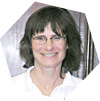| |
 |
|
| |
Amy Jurewicz
Science Team Member
|
|
The following interview occurred on October 11, 2005, between Amy Jurewicz and Jacinta Behne, Genesis education and public outreach team.
JB: Can you share with us how your work as Genesis Project Scientist has evolved from the time of:
AJ: My initial work was centered on readiness for launch and flight. It then moved to cleaning collector tiles. After that, I made gold on sapphire and aluminum on sapphire collection wafers. I also assisted our Principal Investigator—Don Burnett—during which I interacted with him and the science team to verify that for each of the priority elements, there was a collector that would be analyzable and that it would retain that element. Where one was not commercially available, I helped make it.
During spacecraft flight, I catalogued flight spares and samples and worked with curatorial staff to ensure that the archive was prepared and that equipment was prepared to supply samples; anticipating science needs at return.
Following sample return, I provided science team support and fabrication of samples for standardization of measurement of priority isotopes for science team as well as fabrication of analog samples for optimization of elemental or isotopic measurements for science team.
JB: Let’s turn our attention to September 8, 2004, the day of sample return. Where were you?
AJ: At the University of Utah, where I was helping to host the public viewing event in Kingston Hall.
JB: Did the desert landing of the capsule impact your ability to gather science data?
AJ: It did impact people’s ability to gather science data because they needed to clean it first, then verify that the sample was solar wind and not contamination, and it changed the availability of size, shape, and abundance of materials for analysis. It extended our timeline for analysis.
JB: What is your timeline for gathering science data?
AJ: Dan Reisenfeld’s (Los Alamos National Laboratory) data was collected inflight and completed — that was solar wind regime data. Some things have slowed down — curatorial at Johnson Space Center went from trivial to enormous—due to the condition of the collector tiles. Some collectors came out remarkably intact. In moving forward, while the samples require more inspection, in the end, we’ll be close to original anticipated timeline for study.
JB: Today we stand in your laboratory at Arizona State University. What does your current mission work look like? Can you describe a day in the life of?
AJ: We’re still doing the same thing....the work hasn’t changed.
JB: When do you anticipate that we’ll realize the results of science gathering for Genesis?
AJ: Early science return was scheduled for release 18 months post landing, and that appears to be fairly closely on schedule. The whole plan has always been to have results trickling in for the next 50 years, so that as new science theories evolve, we can use Genesis samples to test them, much like lunar samples.
JB: How do you think that history will view this mission?
AJ: In the scientific community, it will be classic and used widely, but it’s going to be a while. It’s still a challenge to get past the media attention on the hard landing.
Read
more interviews with Genesis team members that tell you
about their lives, their jobs, and about the important role
they play in the Genesis mission.
Find out more about Careers
in Aerospace. |
